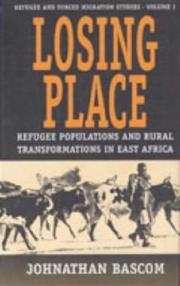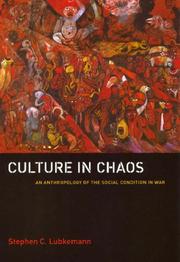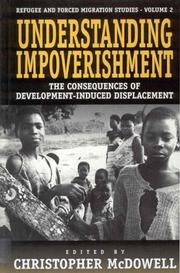| Listing 1 - 3 of 3 |
Sort by
|

ISBN: 1571810838 1782381848 1571818308 Year: 1999 Volume: v.3 Publisher: [Place of publication not identified] : [Berghahn Books],
Abstract | Keywords | Export | Availability | Bookmark
 Loading...
Loading...Choose an application
- Reference Manager
- EndNote
- RefWorks (Direct export to RefWorks)
"Refugee flight, settlement, and repatriation are not static, self-contained, or singular events. Instead, they are three stages of an ongoing process made and mirrored in the lives of real people. For that reason, there is an evident need for historical and longitudinal studies of refugee populations that rise above description and trace the process of social transformation during the "full circle" of flight, resettlement, and the return home. This book probes the economic forces and social processes responsible for shaping the everyday existence for refugees as they move through exile."--Jacket.
Eritreans --- Refugees --- Migration. Refugees --- Economic geography --- East Africa --- Ethnology --- Forced migration. --- Cleansing, Ethnic --- Compulsory resettlement --- Ethnic cleansing --- Ethnic purification --- Involuntary resettlement --- Migration, Forced --- Purification, Ethnic --- Relocation, Forced --- Resettlement, Involuntary --- Migration, Internal

ISBN: 9780226496429 9780226496412 0226496414 0226496422 9780226496436 0226496430 9786612537356 6612537353 1282537350 9781282537354 Year: 2008 Publisher: Chicago University of Chicago press
Abstract | Keywords | Export | Availability | Bookmark
 Loading...
Loading...Choose an application
- Reference Manager
- EndNote
- RefWorks (Direct export to RefWorks)
Fought in the wake of a decade of armed struggle against colonialism, the Mozambican civil war lasted from 1977 to 1992, claiming hundreds of thousands of lives while displacing millions more. As conflicts across the globe span decades and generations, Stephen C. Lubkemann suggests that we need a fresh perspective on war when it becomes the context for normal life rather than an exceptional event that disrupts it. 'Culture in Chaos' calls for a new point of departure in the ethnography of war that investigates how the inhabitants of war zones live under trying new conditions and how culture and social relations are transformed as a result. Lubkemann focuses on how Ndau social networks were fragmented by wartime displacement and the profound effect this had on gender relations. Demonstrating how wartime migration and post-conflict return were shaped by social struggles and interests that had little to do with the larger political reasons for the war, Lubkemann contests the assumption that wartime migration is always involuntary. His critical reexamination of displacement and his engagement with broader theories of agency and social change will be of interest to anthropologists, political scientists, historians, and demographers, and to anyone who works in a war zone or with refugees and migrants.
Migration. Refugees --- Polemology --- War. --- Social conflict. --- Political violence. --- Forced migration. --- Guerre --- Conflits sociaux --- Violence politique --- Migration forcée --- #SBIB:39A11 --- #SBIB:327.5H20 --- Antropologie : socio-politieke structuren en relaties --- Vredesonderzoek: algemeen --- War --- Social conflict --- Political violence --- Forced migration --- Ethnic & Race Studies --- Gender & Ethnic Studies --- Social Sciences --- Migration forcée --- Armed conflict (War) --- Conflict, Armed (War) --- Fighting --- Hostilities --- Wars --- International relations --- Military art and science --- Peace --- Class conflict --- Class struggle --- Conflict, Social --- Social tensions --- Interpersonal conflict --- Social psychology --- Sociology --- Violence --- Political crimes and offenses --- Terrorism --- Cleansing, Ethnic --- Compulsory resettlement --- Ethnic cleansing --- Ethnic purification --- Involuntary resettlement --- Migration, Forced --- Purification, Ethnic --- Relocation, Forced --- Resettlement, Involuntary --- Migration, Internal

ISBN: 1571819274 Year: 1996 Publisher: Providence Berghahn
Abstract | Keywords | Export | Availability | Bookmark
 Loading...
Loading...Choose an application
- Reference Manager
- EndNote
- RefWorks (Direct export to RefWorks)
Economic development --- Forced migration --- Poverty --- Refugees --- Social aspects --- Congresses. --- Displaced persons --- Persons --- Aliens --- Deportees --- Exiles --- Cleansing, Ethnic --- Compulsory resettlement --- Ethnic cleansing --- Ethnic purification --- Involuntary resettlement --- Migration, Forced --- Purification, Ethnic --- Relocation, Forced --- Resettlement, Involuntary --- Migration, Internal --- Development, Economic --- Economic growth --- Growth, Economic --- Economic policy --- Economics --- Statics and dynamics (Social sciences) --- Development economics --- Resource curse --- Social aspects&delete& --- Congresses --- Developing countries --- Emerging nations --- Fourth World --- Global South --- LDC's --- Least developed countries --- Less developed countries --- Newly industrialized countries --- Newly industrializing countries --- NICs (Newly industrialized countries) --- Third World --- Underdeveloped areas --- Underdeveloped countries --- Population
| Listing 1 - 3 of 3 |
Sort by
|

 Search
Search Feedback
Feedback About
About Help
Help News
News